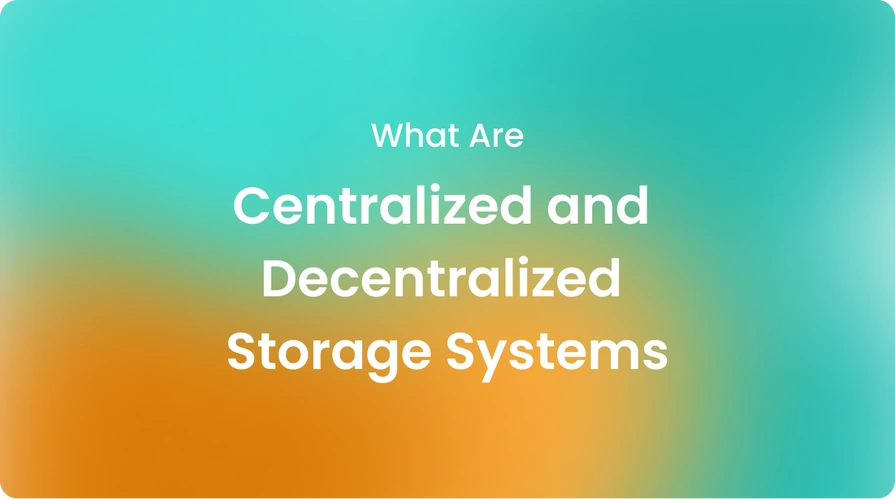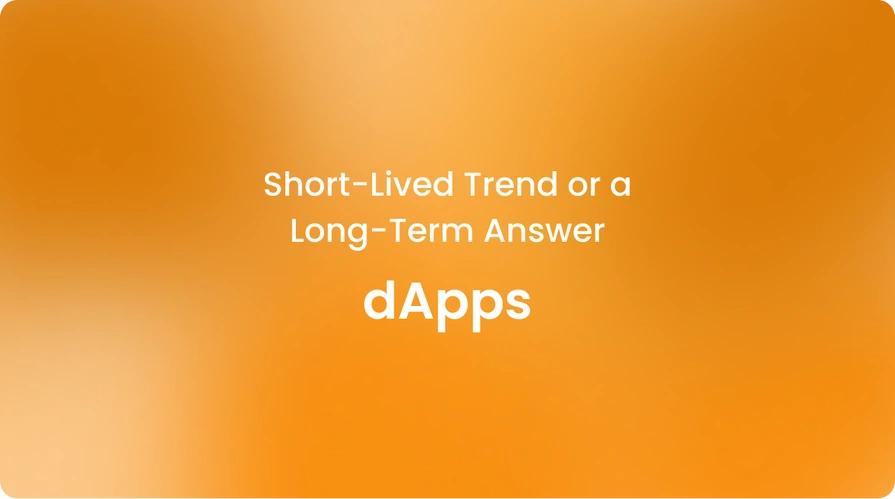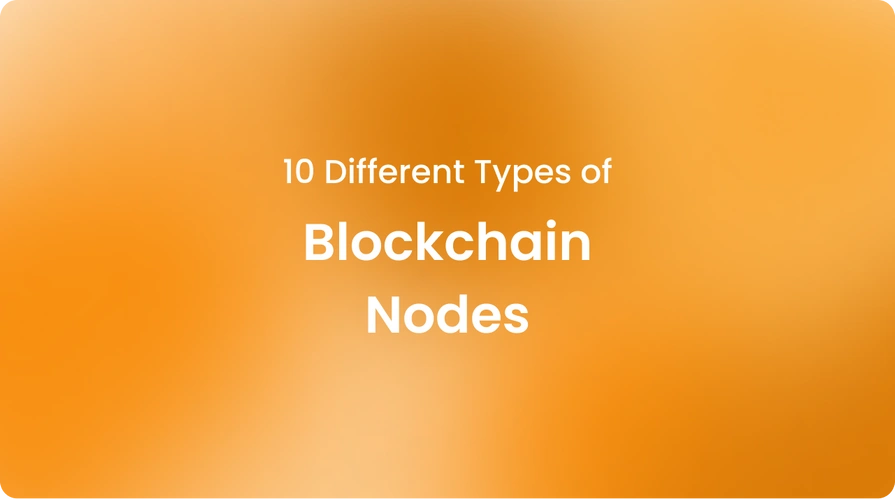|technology, knowledgehub
What Are Centralized and Decentralized Storage Systems?

As our world becomes increasingly digital, the need for robust data storage solutions continues to grow at a rapid pace, and centralized and decentralized storage systems provide solutions in this regard.
Traditionally, centralized cloud storage has been the predominant option for both personal and enterprise use. However, a new approach known as decentralized storage has emerged that offers some compelling advantages over the status quo.
In this article, we'll explore the differences between centralized and decentralized storage systems, weigh the pros and cons of each, and discuss how decentralized storage could reshape the data landscape in the years to come.
Using large cloud storage providers like Amazon S3, Google Drive, or Microsoft OneDrive are examples of centralized storage systems, which is the practice of storing data in a single location or repository under the control of a single party.
With this model, all data is consolidated on massive server farms located in centralized data centers. On the other hand, decentralized storage distributes data across multiple independent types of blockchain nodes or devices that collectively serve to host the data.
As mentioned earlier, centralized systems concentrate all data storage resources in large data centers controlled by a central provider like Amazon, Microsoft, or Google. This comes with risks, as a single disruption could take massive amounts of user data offline.
Decentralized networks avoid this issue by spreading data storage responsibilities across numerous independent operator nodes around the world. There is no single point of control in decentralized storage systems; instead, management is distributed across the entire network.
What is the difference between centralized and decentralized storage?
The key differences between centralized and decentralized storage models come down to issues of control and resilience.
- Centralization: A single authority (company or provider) owns and controls the infrastructure and data. This provides economies of scale but introduces points of failure.
- Decentralization: Data storage responsibilities are distributed across many independent operators. No single entity controls the entire network, increasing resilience.
Large cloud vendors' centralized storage is inherently more vulnerable. If their data centers experience an outage or cyberattack, users could lose access to critical files and applications.
Decentralized networks avoid this security weakness through their distributed nature; even if some nodes fail, the system continues operating.
Additionally, centralization enables government censorship or data access requests more easily by targeting a small number of large providers. Decentralization, on the other hand, makes censorship or unauthorized access technically challenging due to its distributed architecture.
What are the pros and cons of centralization and decentralization?
Both centralization and decentralization models have advantages and disadvantages, depending on your priorities. Here are some of the key points to consider:
Centralization pros
- Economies of scale lower per-unit storage costs.
- Simple, unified access and management platform.
- High service levels through dedicated support teams.
Centralization cons
- A single point of failure risks outages or data loss.
- Vulnerable to censorship or unauthorized access.
- Vendor lock-in concerns for pricing and policy changes.
Decentralization pros
- Enhanced resilience with no single point of failure.
- Increased data sovereignty and censorship resistance.
- Potential for lower overall costs at scale.
Decentralization cons
- Additional complexities of distributed systems
- Slower access times than their centralized counterparts.
- Higher overhead for data verification and consensus.
The points show that centralized storage provides straightforward, low-cost access. However, decentralized networks offer intriguing properties around resilience, control, and long-term costs that will become increasingly important as digital dependency grows, especially with blockchain technology.
What is the major disadvantage of centralization?
Centralization introduces critical single points of failure that can jeopardize data access during outages or cyberattacks. According to a recent report from IDC, 65% of large enterprises and government agencies experienced downtime costs of over $1 million in 2021 due to infrastructure failures or disruptions.
Consolidating all storage responsibilities within the control of a single entity also means locking users and applications into that vendor's ecosystem. This leaves little flexibility should pricing models, service levels, or policies change unexpectedly down the line.
Perhaps the biggest disadvantage, however, is centralization's effects on data ownership and sovereignty. This lack of control could undermine user privacy and trust over the long run as regulations vary globally.
With user files and corporate applications concentrated in massive cloud data centers, there are few technical or policy barriers to government requests for surveillance, censorship, or unauthorized data access.
Why is decentralization important?
For several reasons, decentralization provides a more resilient and trustworthy foundation for digital services moving forward:
- Eliminates critical single points of failure common in centralized networks through distributed architectures. This enhances reliability and ensures data access even if some nodes fail.
- No single entity controls the entire network, increasing censorship resistance. Governments cannot easily regulate or restrict access by pressuring just a few large providers.
- Users own and control their private keys and encryption, rather than relying on a centralized third party. This restores autonomy and sovereignty over personal information.
- Long-term cost savings are possible through disintermediation, as decentralized applications render traditional monopolies unnecessary.
- The distributed nature creates mechanical difficulties for bad actors hoping to compromise or shut down the whole network through any single infiltration point.
For these reasons, decentralization aligns closer with a fair, trustless, and permissionless digital future, benefiting all users globally regardless of their location. Therefore, they are important.
Why is decentralized storage better?
Decentralized storage systems offer several meaningful advantages over centralized storage systems, such as:
Resiliency: Distributing data storage tasks across many independent nodes eliminates the weak points of failure inherent to centralized repositories. The system remains operational even if some parts experience disruptions.
Privacy: Encryption combined with distributed architectures makes mass surveillance nearly impossible. Further, no central authority profiles users or collects aggregated analytics for commercial or political purposes.
Flexibility: Vendor lock-in concerns disappear when switching storage providers simply means migrating files to a new set of decentralized blockchain nodes. Users face no risk of policy changes or termination of service.
Censorship Resistance: No individual government can pressure dominant cloud providers to restrict files within their system's jurisdiction. Content remains available globally without bandwidth or geographic controls.
Cost Savings: While not yet competitive at small scales, decentralized networks lower infrastructure overhead through disintermediation. In the future, they could enable more affordable storage worldwide.
Control: Decentralized ledgers restore user ownership over digital possessions. Individuals alone hold private keys, free of third-party vulnerabilities compromising sensitive data through no fault of their own.
For anyone prioritizing digital autonomy, security, or privacy and switching to decentralized services, Cryptobunq offers a far superior approach to saving and managing precious digital archives and information.
As an expert one-stop-shop crypto service provider, CBQ offers crypto solutions from node as a service to batch payments for individuals and businesses. If you need a crypto service provider that you can trust and rely on, CBQ is here for you.
How can you benefit from decentralized storage solutions?
- Personal cloud backups provide inexpensive, globally redundant archives, safely replacing unreliable personal hard drives.
- Content distribution makes multimedia or software freely available worldwide without hosting or distribution bottlenecks.
- Supply chain data ownership ensures complete visibility and strict access controls for sensitive operational records.
- App deployment leverages global nodes for resilient, high-performance serverless applications without centralized management overheads.
- Surveillance-resistant communications use decentralized storage solutions as an alternate infrastructure, keeping messages private under the law.
- Academic research archives guarantee perpetual access to important papers or data, no matter the survival of the hosting institutions.
- Gamers find lower latency worldwide through distributed networks hosting game server data on nodes closest to each client.
As one of the leading firms providing cryptocurrency security alongside decentralized payments and storage, Cryptobunq offers seamless blockchain integration for any use case.
Our solutions are proven at Web3 scale and can be customized to any technical or operational requirements through our robust APIs with our exchange API solutions.
The bottom line: building resilient data infrastructure on decentralized foundations
Cryptobunq can effectively power your applications, business, or archive needs with blockchain-certified storage through its versatile APIs. Decentralized storage represents a paradigm shift that could profoundly impact how individuals and organizations interact with data globally in the coming decades.
By eliminating critical centralized vulnerabilities while restoring user autonomy, control, and censorship resistance, this emerging technology ushers in a more fair, robust, and trusting digital future for all.
As these networks continue to scale, decentralized storage promises to level the playing field of technology worldwide and empower communities that have long lacked affordable access. It's an evolution worth following closely.
If you want to adapt to this technology and benefit from expert blockchain-powered crypto services, contact us. CBQ is here to guide and help you in the crypto and blockchain ecosystem with secure solutions!













